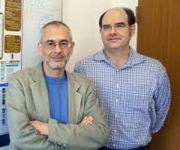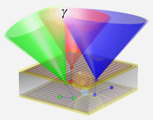


Berkeley Lab’s Victor Markowitz and Nikos Kyrpides lead the Data Acquisition and Coordination Center for the Human Microbiome Project. The HMP is a multi-institutional effort to gain a better understanding of the community of microbes that outnumber the human cells in our bodies by a 10:1 ratio and are critical to our health and physical well being. Other Lab researchers with prominent roles in the HMP include Gary Andersen, Todd DeSantis, Amy Chen, Konstantinos Liolios, Amrita Pati and Konstantinos Mavrommatis. More>
 The Nuclear Science Division (NSD) has received two grants from the Department of Energy showcasing NSD’s Applied Nuclear Physics program, which adapts basic research methods to practical needs like cancer therapy and homeland security. Lucian Mihailescu is the principal investigator of a three-year, $1 million-plus project funded by the American Recovery and Reinvestment Act (ARRA) to refine techniques for three-dimensional imaging with gamma rays, especially ion-beam therapy. Kai Vetter, head of the Applied Nuclear Physics program, leads a similar project funded directly by DOE for improved radiation detectors. More>
The Nuclear Science Division (NSD) has received two grants from the Department of Energy showcasing NSD’s Applied Nuclear Physics program, which adapts basic research methods to practical needs like cancer therapy and homeland security. Lucian Mihailescu is the principal investigator of a three-year, $1 million-plus project funded by the American Recovery and Reinvestment Act (ARRA) to refine techniques for three-dimensional imaging with gamma rays, especially ion-beam therapy. Kai Vetter, head of the Applied Nuclear Physics program, leads a similar project funded directly by DOE for improved radiation detectors. More>
 Last week, the OPERA Collaboration based at the Gran Sasso underground laboratory in Italy announced the first direct observation of one “flavor” of neutrino turning into a different flavor. The observation confirms that neutrinos oscillate among flavors, an idea favored by physicists for over 40 years but never before seen directly. Neutrino hunter Kevin Lesko of Berkeley Lab’s Nuclear Science Division says the OPERA experiment, “where you see one species disappear and reappear as a different species, really nails the neutrino oscillation phenomenon.” More>
Last week, the OPERA Collaboration based at the Gran Sasso underground laboratory in Italy announced the first direct observation of one “flavor” of neutrino turning into a different flavor. The observation confirms that neutrinos oscillate among flavors, an idea favored by physicists for over 40 years but never before seen directly. Neutrino hunter Kevin Lesko of Berkeley Lab’s Nuclear Science Division says the OPERA experiment, “where you see one species disappear and reappear as a different species, really nails the neutrino oscillation phenomenon.” More>
 UC News: New Edition of 'Our University' Posted
UC News: New Edition of 'Our University' Posted The June issue of Our University, the University of California's systemwide newsletter for faculty and staff, has been published. It includes a story on long-time faculty and staff who are retiring, a video interview with Provost Lawrence Pitts, updates from the Post-Employment Benefits Task Force, and a piece on how partnerships between UC researchers and private companies are creating jobs while advancing green technologies.
 EBI: Institute's 2009 Annual Report Published
EBI: Institute's 2009 Annual Report Published An 88-page summary of the activities in which the Energy Biosciences
Institute is engaged to apply modern biological science to responsible
solutions for future energy needs has been published and is now available. The institute's 2009 Annual Report is a compilation of research summaries, scientist profiles, and EBI status reports as the ten-year, $500-million collaboration concluded its second full year of operation.
Today
at Berkeley Lab encourages feedback and story ideas
Deadline for submissions is 10 a.m. two days prior to publication
TABL is produced by Public Affairs' Communications Group